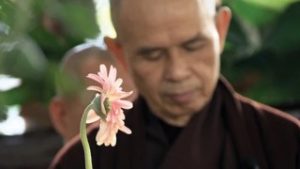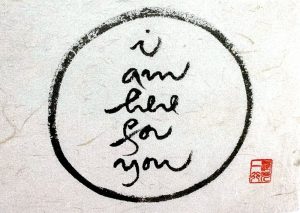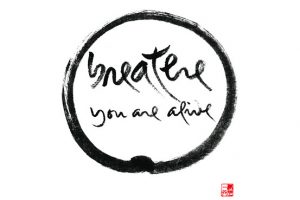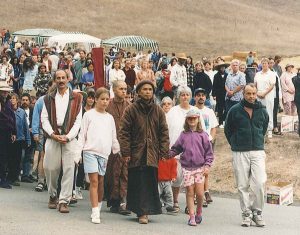 The Yogabliss, Your Heart Life on-line Moving into Meditation classes met this morning. In today’s class we honored the passing of Buddhist meditation teacher Thich Nhat Hanh. His students affectionately refer to him as “Thay.” We explored his teachings on turning fear into love. These teaching center on mindfulness, loving kindness, deep listening and loving speech. Thay’s poetic voice made these perennial wisdom teachings accessible to people all over the world.
The Yogabliss, Your Heart Life on-line Moving into Meditation classes met this morning. In today’s class we honored the passing of Buddhist meditation teacher Thich Nhat Hanh. His students affectionately refer to him as “Thay.” We explored his teachings on turning fear into love. These teaching center on mindfulness, loving kindness, deep listening and loving speech. Thay’s poetic voice made these perennial wisdom teachings accessible to people all over the world.
We drew heavily on his book, Fear: Essential Wisdom for Getting Through the Storm. He outlines four mantras or affirmations for transforming fear into love. He outlines the steps for establishing concentration and bringing body and mind to focus as one. Then, he offers mantras that affirm our emotional needs for connection and love. His teachings reflects our inter-being: we “inter-depend” on one another for our well being.
 We heard Thay’s poem, Recommendation. Thay wrote his poem during the Vietnam war. His life and the lives of his students were at risk on a daily basis. Yet this poem encourages insight, compassion and forgiveness. You can read the poem and hear a beautiful musical rendition of it on the Plum Village web-site.
We heard Thay’s poem, Recommendation. Thay wrote his poem during the Vietnam war. His life and the lives of his students were at risk on a daily basis. Yet this poem encourages insight, compassion and forgiveness. You can read the poem and hear a beautiful musical rendition of it on the Plum Village web-site.
Relaxed Reflection
Mindfulness is a tent under which everyone is welcome. One of the world’s greatest teachers of mindfulness, Thich Nhat Hanh taught that “when we generate mindfulness, compassion and understanding become possible, and we can allow people to love us.” When we practice mindfulness we are taking care of ourselves so that we can love others.
 Thich Nhat Hanh passed away yesterday. As many of you may know, he has been a beloved teacher for thousands of people around the world. He began his lifelong work of social activism during the Viet Nam war. He taught mindfulness in action to help relieve suffering individual and collective suffering. Today, we can dedicate our practice to Thay in gratitude. We can aspire to continue to live his teachings of loving kindness and compassion.
Thich Nhat Hanh passed away yesterday. As many of you may know, he has been a beloved teacher for thousands of people around the world. He began his lifelong work of social activism during the Viet Nam war. He taught mindfulness in action to help relieve suffering individual and collective suffering. Today, we can dedicate our practice to Thay in gratitude. We can aspire to continue to live his teachings of loving kindness and compassion.
Take a moment now to arrive. Feel your body and the places it meets Earth’s body. You can move your awareness through your body. Gently acknowledge your senses – eyes, ears, nose and tongue. Sense your face and its tender places of expression. Be aware of your brain and the miracle of mind throughout your nervous system. Experience inner being by feeling heart beat, breathing, currents of subtle energy. Sense the mantle of your upper back and shoulders, the aliveness in your arms and hands. Feel your spine – its central channel as a river bed and tributaries or as a tree with branches. Aware of being grounded through your pelvis, hips, legs and feet.
 You can notice hard and soft areas. Explore the open or closed places you sense around your heart, your belly. Can you cultivate a sense of openness and receptivity? Can you be present with what is revealing itself each passing moment? If there is a sense of welcome – how is it to enjoy welcome? If there is a sense of struggle – can you offer compassion.. You can place a hand over your heart and say: “Dear One, I am here for you.”
You can notice hard and soft areas. Explore the open or closed places you sense around your heart, your belly. Can you cultivate a sense of openness and receptivity? Can you be present with what is revealing itself each passing moment? If there is a sense of welcome – how is it to enjoy welcome? If there is a sense of struggle – can you offer compassion.. You can place a hand over your heart and say: “Dear One, I am here for you.”
Dear One, I am here for you. This is the Mantra for Offering Your presence, one of Thay’s four healing mantras for transforming fear into love. In his book, Fear: Essential Wisdom for Getting Through the Storm, Thich Nhat Hanh writes:
A mantra is a kind of magic formula that, once uttered, can entirely change a situation. It can change us, and it can change others. But this magic formula must be spoken in concentration, with body and mind focused as one. What you say in this state of being becomes a mantra.
Maria Popova describes this as an “. . . entirely practical sort of magic, for a mantra simply clarifies, concentrates, and consecrates intent, and all meaningful transformation springs from purposeful, devoted intent.” We can reflect on our own intention for this mindfulness practice today.
 We are sitting here. We look deeply and guide our hearts to the present moment.
We are sitting here. We look deeply and guide our hearts to the present moment.
This open hearted willingness to stay present is the garden in which so much possibility grows. Our capacity for presence is where our capacity for love resides. As relational beings we can extend this presence to others. You can bring to mind a beloved one in your life. Visualize them or sense their presence. You can try The second Mantra for Recognizing Your Beloved, “Darling, I know you are there, and I am so happy.”
Because you are fully there, you recognize that the presence of your beloved is something very precious. You embrace your beloved with mindfulness, and he or she will bloom like a flower. To be loved means first of all to be recognized as existing.
Thay’s third Mantra for Relieving Suffering, springs from our intention “. . . to [really] be there, for [our self], for life, for the people [we] love. You can call to mind a dear one who may be suffering right now. You can “. . . manifest your true presence to your beloved and say the mantra with all your mindfulness: “Dear one, I know you are suffering. That is why I am here for you.” . . .
 Your presence is a miracle, your understanding of his or her pain is a miracle, and you are able to offer this aspect of your love immediately. Really try to be there, for yourself, for life, for the people you love.
Your presence is a miracle, your understanding of his or her pain is a miracle, and you are able to offer this aspect of your love immediately. Really try to be there, for yourself, for life, for the people you love.
Finally, the “Mantra for Reaching Out to Ask for Help,” may be the most challenging. It calls us to be vulnerable. Thay explains:
This mantra is for when you are suffering and you believe that your beloved has caused you suffering. If someone else had done the same wrong to you, you would have suffered less. But this is the person you love the most, so you suffer deeply, and the last thing you feel like doing is to ask that person for help…
When you are suffering like this, you must go to the person you love and ask for his or her help. That is true love. Do not let pride keep you apart. You must overcome your pride. You must always go to him or her. That is what this mantra is for. Practice for yourself first, to bring about oneness of your body and mind before going to the other person to say the fourth mantra: “Dear one, I am suffering; please help.” This is very simple but very hard to do.
Which mantra will ring the bell of mindfulness in your heart today?
 Dear One, I am here for you.
Dear One, I am here for you.
Darling, I know you are there, and I am so happy.
Dear one, I know you are suffering. That is why I am here for you.
Dear one, I am suffering; please help.
In our tumultuous lives of change and conflict, we can enjoy these moments of calm. We can become peacemakers. We can practice deep listening so that we engage the world with loving kindness and compassion. Thay reminds us that:
The intention of deep listening and loving speech is to restore communication, because once communication is restored, everything is possible, including peace and reconciliation.
We are all capable of recognizing that we’re not the only ones who suffer when there is a hard situation. The other person in that situation suffers as well, and we are partly responsible for his or her suffering. When we realize this, we can look at the other person with the eyes of compassion and let understanding bloom. With the arrival of understanding, the situation changes and communication is possible.
Any real peace process has to begin with ourselves…
 Today and everyday we can become peacemakers. We can listen deeply and speak lovingly. Thay wrote his poem, Recommendation, during the Vietnam war. His life and the lives of his students were at risk on a daily basis. Yet this poem encourages insight, compassion and forgiveness.
Today and everyday we can become peacemakers. We can listen deeply and speak lovingly. Thay wrote his poem, Recommendation, during the Vietnam war. His life and the lives of his students were at risk on a daily basis. Yet this poem encourages insight, compassion and forgiveness.
Promise me,
promise me this day,
promise me now,
while the sun is overhead
exactly at the zenith,
promise me:
Even as they
strike you down
with a mountain of hatred and violence;
even as they step on you and crush you
like a worm,
even as they dismember and disembowel you,
remember brother, remember:
man is not our enemy.
The only thing worthy of you is compassion –
invincible, limitless, unconditional.
Hatred will never let you face
the beast in man.
 One day, when you face this beast alone with your courage intact, your eyes kind,
untroubled
One day, when you face this beast alone with your courage intact, your eyes kind,
untroubled
(even as no one sees them),
out of your smile
will bloom a flower.
And those who love you
will behold you
across ten thousand worlds of birth and dying.
Alone again,
I will go on with bent head,
knowing that love has become eternal.
On the long, rough road
the sun and moon will continue to shine.
